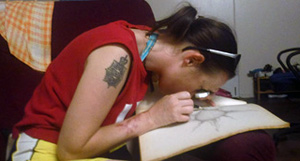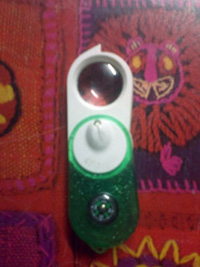Shelley and Shona's story
Our bodies may be broken but our hearts stay strong
Our bodies may be different but our spirit still belongs
No matter what others might think we will always find a way
To overcome the challenges of each and every day.- Shelley Heaton

Shelley received support and encouragement from her mum, and it helped shift her perspective.
‘I got out of the funk, and thought "Okay, what can I do?"', she says.
‘There is life after disability. The whole world looks at you like "You can't do this" and "You can't do that", but if you let a person go, they'll just learn how to do things differently. Ask anyone I know—they will tell you I'm as stubborn as a mule and I'll find a way to do something.'
Shelley shares how she has made adjustments so she can continue with a hobby and has supported her daughter, Shona, with understanding her disability. She also talks about community awareness and how people can support Queenslanders with disability.

A fresh approach to art
Losing her vision over several years has changed Shelley's approach to art—a hobby she has enjoyed since she was a teenager.
‘I used to get into shading and put detail into it (drawing) and I can't do that anymore,' she says.
Now, Shelley draws using a magnifying glass, looking at parts of a picture at a time and seeing ‘the whole picture' in her head.
‘I can still do drawing, poetry; any kind of hobby,' she says.
‘It's just looking at things in a different way.'
A family adjustment
Shelley receives support from her daughter, Shona, 12, a young carer.
Shona has become more protective as her mum has lost her sight. She has attention deficit disorder (ADD), but, with her mum's help, she has accepted extra responsibilities at home.
‘The more stuff I do with her, the more she remembers,' says Shelley.
‘She does the washing and puts the dishes away.'
Shona is receiving support from a counsellor to help her cope with adjusting to her mum's disability.
She thought about imaginary friends to help her deal with being away from her mum at school.
‘They were her coping mechanisms for being away from me,' says Shelley.
Shona has also experienced bullying at school.
‘It has definitely been tough for her,' says Shelley. ‘She is more emotional. It comes from the fact that I have a disability.'
Information is available on Disability Online about support for children and young people, as well as parents, carers and teachers, with dealing with bullying.
Creating community awareness
Shelley has gone up to her daughter's school to promote awareness and understanding about what it's like to live with disability.
Shelley has a guide dog, and if people approach her in the community, she explains to them 'why you shouldn't touch my dog'.
She encourages the wider community to appreciate people with disability for their abilities, and to find out how they can help.
‘There are actually people out there who can help in the right ways, but they need to be educated,' says Shelley.
More information
- Guide Dogs Queensland provides advice about why you shouldn't pat, feed or distract a guide dog if it is working. You can also read Guide Dogs Queensland's information about ways to help. You can call Guide Dogs Queensland on 1800 810 122.
- Vision Australia is a partnership between people who are blind, sighted or have low vision. You can call Vision Australia on 1300 84 74 66. If you are deaf, or have a hearing or speech disability, call through the National Relay Service:
- TTY users phone 133 677 then ask for 1300 84 74 66
- Speak and Listen users phone 1300 555 727 then ask for 1300 84 74 66
- Internet relay users connect to the National Relay Service then ask for 1300 84 74 66.